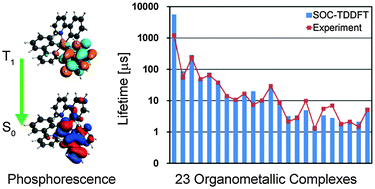Predicting phosphorescent lifetimes and zero-field splitting of organometallic complexes with time-dependent density functional theory including spin–orbit coupling†
Abstract
The (photo)physical properties of organometallic complexes are crucially affected by relativistic effects. In a non- or scalar-relativistic picture, triplet states are threefold degenerate. Spin–orbit coupling lifts this degeneracy (zero-field splitting, ZFS) and enables phosphorescence from the three triplet-like states to the ground state. The fine structure and radiative lifetimes of phosphorescent organometallic complexes are important properties for designing efficient organic light-emitting diodes (OLEDs). Here we show that experimental ZFSs and phosphorescent lifetimes for a large variety of organometallic complexes are well reproduced by self-consistent spin–orbit coupling TDDFT (SOC-TDDFT) calculations with a continuum solvation model. By comparing with perturbative SOC-TDDFT and gas phase calculations, we find that both full spin–orbit and solvation effects are important for the predicted properties. SOC-TDDFT is thus shown to be a useful predictive tool for the rational design of phosphors in OLEDs and other optoelectronic devices.

- This article is part of the themed collection: Density functional theory and its applications

 Please wait while we load your content...
Please wait while we load your content...